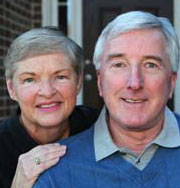PERSONAL SAFETY & CRIME PREVENTION - Senior Citizen Safety Tips
As people grow older, their chance of being victims of crime decreases dramatically. However, with a lifetime of experience and the physical problems associated with aging, older Americans may feel fearful. Though they might be on the lookout for physical attack and/or burglary, seniors are not as alert to frauds and con-games—their greatest crime threat. Following lists common-sense precautions to keep seniors safe.
Be Alert When Out and About
- Go with friends or family, not alone.
- Carry your purse close to your body, not dangling by the straps. Put a wallet in an inside coat or front pants pocket.
- Don't carry credit cards you don't need or large amounts of cash.
- Use direct deposit for Social Security and other regular checks.
- Whether you're a passenger or driver, keep car doors locked. Be particularly alert in parking lots and garages. Always park near an entrance.
- Sit close to the driver or near the exit while riding the bus.
- If someone or something makes you uneasy, trust your instincts and leave.
Make Your Home Safe and Secure
- Install good locks on doors and windows. Use them!
- Don't hide keys in mailboxes and planters or under doormats. Instead, leave an extra set of keys with a neighbor or friend.
- Ask for photo identification from service or delivery people before letting them in. If you are the least bit worried, call the company to verify.
- Be sure your street address number is large, clear of obstruction, and well-lighted so police and other emergency personnel can find your home quickly.
- Consider a home alarm system that provides monitoring for burglary, fire, and medical emergencies.
Watch Out for Con Artists
- Don't fall for anything that sounds too good to be true—a free vacation, sweepstakes prizes, cures for cancer and arthritis, a low-risk, or a high-yield investment scheme.
- Never give your credit card, phone card, Social Security, or bank account number to anyone over the phone. It's illegal for telemarketers to ask for these numbers to verify a prize or gift.
- Don't let anyone rush you into signing anything—an insurance policy, a sales agreement, a contract. Read it carefully and have someone you trust check it over.
- Beware of individuals claiming to represent companies, consumer organizations, or government agencies that offer to recover lost money from fraudulent telemarketers for a fee.
If you're suspicious, check it out with the police, the Better Business Bureau, or local consumer protection office. Call the National Consumers League Fraud Information Center at 800.876.7060.
Get Involved in the Community
- Report any crime or suspicious activities to law enforcement.
- Form a neighborhood watch to look out for each other and help the police.
- Work to change conditions that hurt your neighborhood. Volunteer as a citizen patroller, tutor for children, office aide in the police or fire departments, mentor for teens, escort for individuals with disabilities, etc.
Source: National Crime Prevention Council
Top

